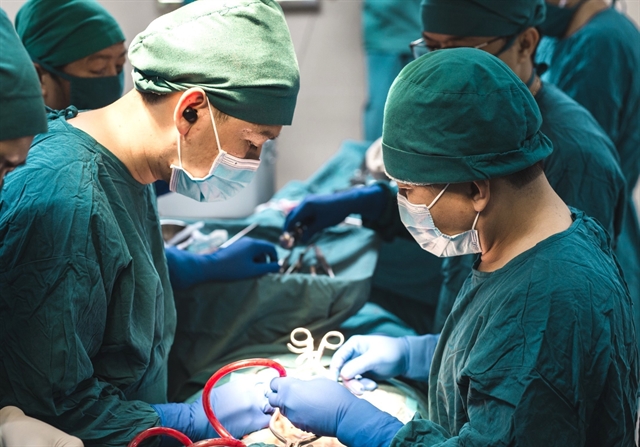 Society
Society

 |
| Doctors perform surgery on a patient suffering from traumatic brain injury at Phú Yên Provincial General Hospital. — VNA/VNS Photos |
HÀ NỘI — Required to undertake extensive training with enormous costs and a highly intensive working environment, yet most doctors do not receive proportional compensation for their efforts. Things are expected to change as a salary reform goes into effect on July 1 this year.
A fresh medical graduate, Đ.T.N. is looking to continue their education at Thái Bình University of Medicine and Pharmacy as a resident doctor.
However, with the course lasting three years, N. struggled to make a decision due to their family’s difficult financial situation.
“It’s a huge burden for my family to provide for me throughout nine years of study to be a skilled doctor, so I hope to get a job at a hospital to have the means to pay for my tuition.
“I asked the local authorities to see if there is a loan policy for medical residents, but there’s none,” said N.
N.M.T., a doctor in Hà Nội was the pride of their parents when they got accepted to a medical university, but are now struggling to make ends meet with a level-1 salary (around US$170 per month).
T. said that they probably have not survived with this compensation if they were not passionate about the profession and did not have family support.
Their hospital also required a further 18-month course for a practising certificate, which means more expenses to cover.
Phạm Thanh Bình, chairman of the Việt Nam National Union of Health Workers, said that the medical industry has the highest examination entrance score, longest education period, highest pressure and most occupational risks, yet has the lowest salary which stands at 17th out of the total 18 official industries.
The health and education sectors are looking forward to Resolution 27 on salary reforms, but while education professionals are entitled to salary increases based on their years of professional experience, medical workers are not, said Bình.
According to the proposal, health professionals will not enjoy a 30 per cent enhancement in base salary like their counterparts in the education sector.
Meanwhile, the level of allowances in the health sector remains unchanged at VNĐ18,000-125,000 ($0.7-5) per shift since 2013, while the base salary has increased from VNĐ830,000 ($33.5) to VNĐ1.8 million ($72.6).
Dr Nguyễn Sinh Hiền, director of Hà Nội Heart Hospital said: “When a person chooses to study to be a doctor, they already commit to two more years of studying compared to other industries.
“Then it will take them three more years as a resident physician or pursuing specialised training. That means they spend at least 10 years to become a ‘skilled’ doctor to provide examination and treatment and have the patient’s trust.
“Throughout those 10 years, who will provide for them?”
 |
| A child with cleft lip and palate deformities receives a free preliminary examination from doctors of HCM City University of Medicine and Pharmacy Hospital. |
Hope for change
According to Hiền, the State has paid special attention to medical workers in recent years, such as providing allowances and benefits for healthcare staff during the pandemic and celebrating excellent physicians in their fields.
Hospital leaders also make efforts to enhance the well-being of their staff and improve employee retention rates.
“The two most important things for medical workers are decent compensation and a safe working environment.
“They have the need to study, work, contribute and innovate. In a favourable environment, they will surely do their best. Therefore, at our facility, we regularly open conversations to listen to their voice and make necessary adjustments when needed,” said Hiền.
Việt Nam National Union of Health Workers chairman Bình said: “Investing in a specialised sector such as healthcare requires a high-quality workforce. We hope that more attention will be paid to support policies.
“Most medical workers make tremendous efforts in their studies to go from a nursing degree to undergraduate and graduate level, but do not receive an on-par salary range afterwards.
“This has to change so that they can put all their minds into studying, improving their expertise and then receive appropriate compensation.”
The Ministry of Health is proposing that the starting salary for doctors and preventive medicine doctors will start at level 2 instead of 1, in addition to the highest level of compensation increase following salary reforms (30 per cent).
Minister of Home Affairs Phạm Thị Thanh Trà said that salary reforms will be the driving force for economic growth, as the changes will affect supply and demand.
This adjustment is the most radical and comprehensive among the four salary reforms since 1960, according to the minister.
The new structure consists of a base salary (70 per cent) and allowances (30 per cent), removing all specific salary policies and increasing the base salary range by 10 per cent.
“With this salary reform, the health and education sectors will achieve their goal of increasing compensation for workers. Public employees, especially teachers and doctors, will benefit from this,” said Trà.
Vũ Văn Tiến, a doctor at a general hospital in Hải Phòng City, told Lao Động (Labour) newspaper: “Physicians’ salary is not high, in general.
“New doctors earn around VNĐ4 million ($160) per month, and seasoned medical practitioners only VNĐ10 million ($400) per month.
“From my observations, doctors with low income mostly work at the grassroots level such as ward or commune-level health stations, or at centres for disease control.
“If there is a salary increase, I hope that they will be given priority,” added Tiến.
Trần Thị Ánh, a doctor at Quảng Ninh Provincial General Hospital, said that including health workers in the group with the highest salary increase, following salary reforms that take effect on July 1 this year, is a move in the right direction.
“The starting salary for young doctors is usually very low, while the amount of allowances is not significant.
“Therefore, to improve the livelihoods of medical workers and motivate them, I believe that there should be a customised salary scale for the health sector, with appropriate increases.”
It takes a lot of time and effort to become a skilled physician, she said, in addition to the significant costs of education and training.
“If the compensation does not match these efforts, young doctors will lack the motivation to pursue their careers.
“Therefore, millions of doctors, who are public employees, are really hopeful about this salary reform,” said Ánh. — VNS




